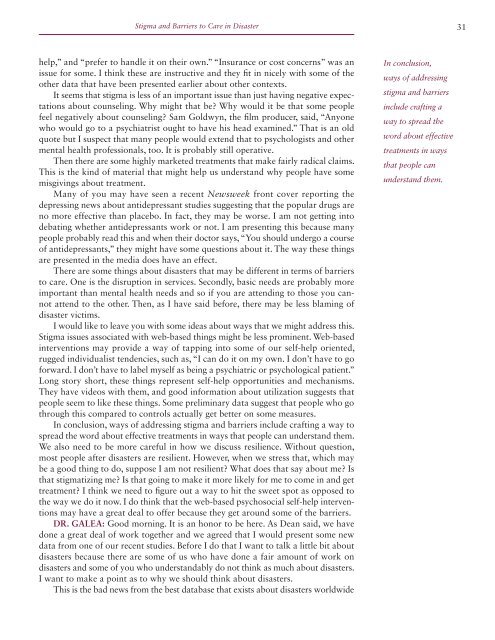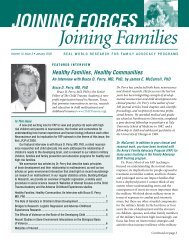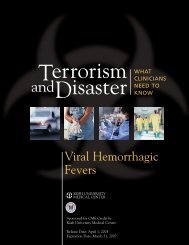stigma and barriers to care - Uniformed Services University of the ...
stigma and barriers to care - Uniformed Services University of the ...
stigma and barriers to care - Uniformed Services University of the ...
Create successful ePaper yourself
Turn your PDF publications into a flip-book with our unique Google optimized e-Paper software.
Stigma <strong>and</strong> Barriers <strong>to</strong> Care in Disaster 31<br />
help,” <strong>and</strong> “prefer <strong>to</strong> h<strong>and</strong>le it on <strong>the</strong>ir own.” “Insurance or cost concerns” was an<br />
issue for some. I think <strong>the</strong>se are instructive <strong>and</strong> <strong>the</strong>y fit in nicely with some <strong>of</strong> <strong>the</strong><br />
o<strong>the</strong>r data that have been presented earlier about o<strong>the</strong>r contexts.<br />
It seems that <strong>stigma</strong> is less <strong>of</strong> an important issue than just having negative expectations<br />
about counseling. Why might that be Why would it be that some people<br />
feel negatively about counseling Sam Goldwyn, <strong>the</strong> film producer, said, “Anyone<br />
who would go <strong>to</strong> a psychiatrist ought <strong>to</strong> have his head examined.” That is an old<br />
quote but I suspect that many people would extend that <strong>to</strong> psychologists <strong>and</strong> o<strong>the</strong>r<br />
mental health pr<strong>of</strong>essionals, <strong>to</strong>o. It is probably still operative.<br />
Then <strong>the</strong>re are some highly marketed treatments that make fairly radical claims.<br />
This is <strong>the</strong> kind <strong>of</strong> material that might help us underst<strong>and</strong> why people have some<br />
misgivings about treatment.<br />
Many <strong>of</strong> you may have seen a recent Newsweek front cover reporting <strong>the</strong><br />
depressing news about antidepressant studies suggesting that <strong>the</strong> popular drugs are<br />
no more effective than placebo. In fact, <strong>the</strong>y may be worse. I am not getting in<strong>to</strong><br />
debating whe<strong>the</strong>r antidepressants work or not. I am presenting this because many<br />
people probably read this <strong>and</strong> when <strong>the</strong>ir doc<strong>to</strong>r says, “You should undergo a course<br />
<strong>of</strong> antidepressants,” <strong>the</strong>y might have some questions about it. The way <strong>the</strong>se things<br />
are presented in <strong>the</strong> media does have an effect.<br />
There are some things about disasters that may be different in terms <strong>of</strong> <strong>barriers</strong><br />
<strong>to</strong> <strong>care</strong>. One is <strong>the</strong> disruption in services. Secondly, basic needs are probably more<br />
important than mental health needs <strong>and</strong> so if you are attending <strong>to</strong> those you cannot<br />
attend <strong>to</strong> <strong>the</strong> o<strong>the</strong>r. Then, as I have said before, <strong>the</strong>re may be less blaming <strong>of</strong><br />
disaster victims.<br />
I would like <strong>to</strong> leave you with some ideas about ways that we might address this.<br />
Stigma issues associated with web-based things might be less prominent. Web-based<br />
interventions may provide a way <strong>of</strong> tapping in<strong>to</strong> some <strong>of</strong> our self-help oriented,<br />
rugged individualist tendencies, such as, “I can do it on my own. I don’t have <strong>to</strong> go<br />
forward. I don’t have <strong>to</strong> label myself as being a psychiatric or psychological patient.”<br />
Long s<strong>to</strong>ry short, <strong>the</strong>se things represent self-help opportunities <strong>and</strong> mechanisms.<br />
They have videos with <strong>the</strong>m, <strong>and</strong> good information about utilization suggests that<br />
people seem <strong>to</strong> like <strong>the</strong>se things. Some preliminary data suggest that people who go<br />
through this compared <strong>to</strong> controls actually get better on some measures.<br />
In conclusion, ways <strong>of</strong> addressing <strong>stigma</strong> <strong>and</strong> <strong>barriers</strong> include crafting a way <strong>to</strong><br />
spread <strong>the</strong> word about effective treatments in ways that people can underst<strong>and</strong> <strong>the</strong>m.<br />
We also need <strong>to</strong> be more <strong>care</strong>ful in how we discuss resilience. Without question,<br />
most people after disasters are resilient. However, when we stress that, which may<br />
be a good thing <strong>to</strong> do, suppose I am not resilient What does that say about me Is<br />
that <strong>stigma</strong>tizing me Is that going <strong>to</strong> make it more likely for me <strong>to</strong> come in <strong>and</strong> get<br />
treatment I think we need <strong>to</strong> figure out a way <strong>to</strong> hit <strong>the</strong> sweet spot as opposed <strong>to</strong><br />
<strong>the</strong> way we do it now. I do think that <strong>the</strong> web-based psychosocial self-help interventions<br />
may have a great deal <strong>to</strong> <strong>of</strong>fer because <strong>the</strong>y get around some <strong>of</strong> <strong>the</strong> <strong>barriers</strong>.<br />
DR. GALEA: Good morning. It is an honor <strong>to</strong> be here. As Dean said, we have<br />
done a great deal <strong>of</strong> work <strong>to</strong>ge<strong>the</strong>r <strong>and</strong> we agreed that I would present some new<br />
data from one <strong>of</strong> our recent studies. Before I do that I want <strong>to</strong> talk a little bit about<br />
disasters because <strong>the</strong>re are some <strong>of</strong> us who have done a fair amount <strong>of</strong> work on<br />
disasters <strong>and</strong> some <strong>of</strong> you who underst<strong>and</strong>ably do not think as much about disasters.<br />
I want <strong>to</strong> make a point as <strong>to</strong> why we should think about disasters.<br />
This is <strong>the</strong> bad news from <strong>the</strong> best database that exists about disasters worldwide<br />
In conclusion,<br />
ways <strong>of</strong> addressing<br />
<strong>stigma</strong> <strong>and</strong> <strong>barriers</strong><br />
include crafting a<br />
way <strong>to</strong> spread <strong>the</strong><br />
word about effective<br />
treatments in ways<br />
that people can<br />
underst<strong>and</strong> <strong>the</strong>m.




